A Pear and Prayer
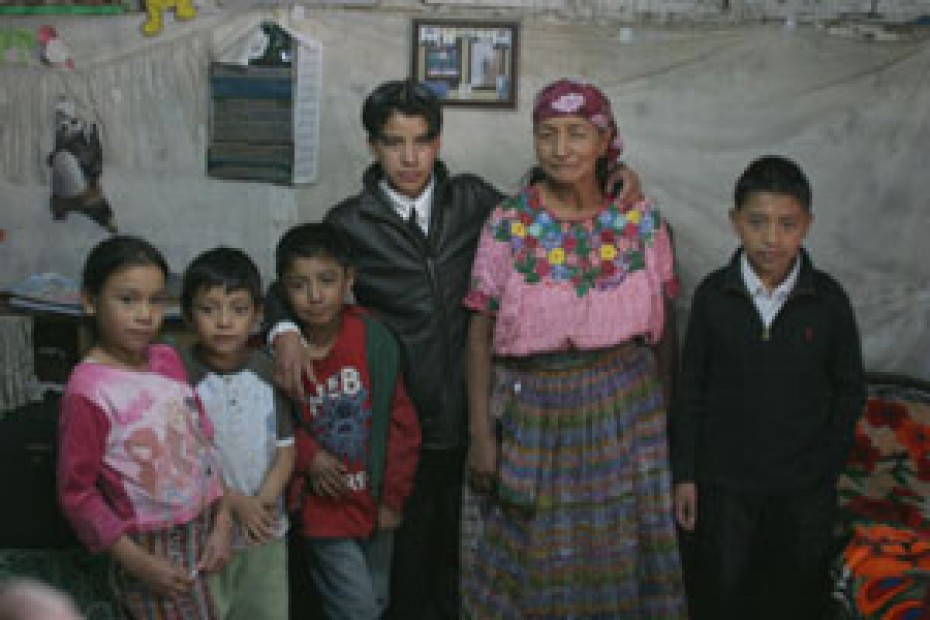
There is nothing in the world like visiting a Compassion-assisted child’s home. Absolutely nothing. Nothing can prepare you for the sights, the sounds, the smells. Most of all, nothing can prepare you for the beating your heart is about to take. It’s like you got in a fight with the Holy Spirit. And every time, the Holy Spirit leaves you limping and bruised and, thankfully, a better person for the battle.
Continue Reading ›Providing an Inheritance to Children in Poverty
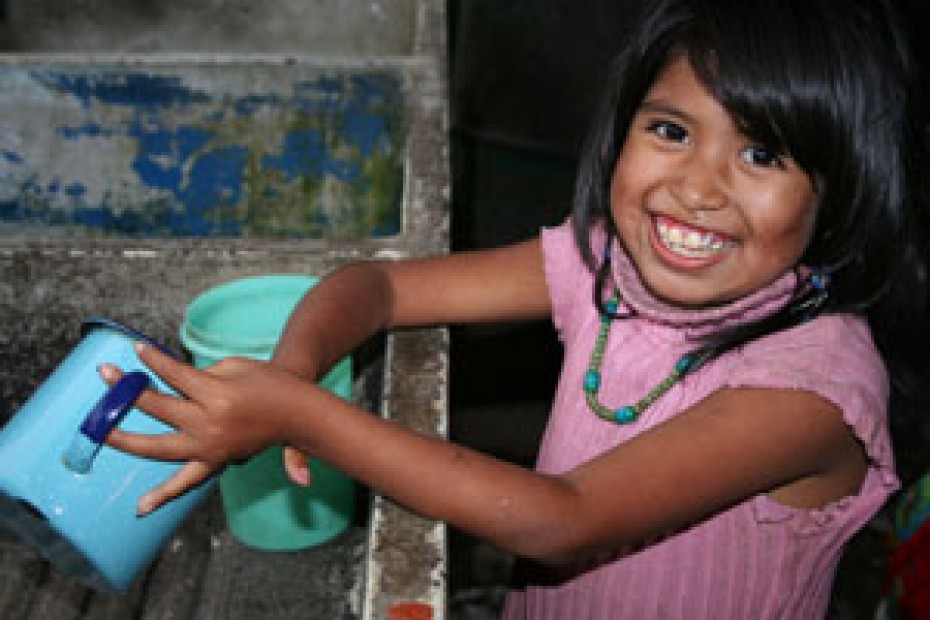
Mariana’s mother gathers the family around her at night to read a portion of the Bible and to pray together. She knows this is the best inheritance she could leave her children.
Continue Reading ›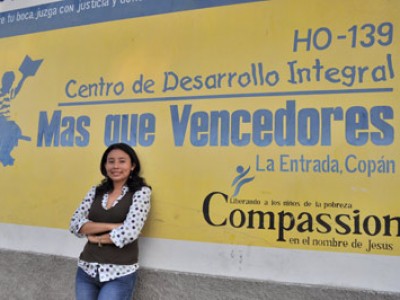
“Look After Your Sisters, and Do Something Good With Your Life.”
Just before passing away Vilma’s mother asked Vilma for two things, to look after her sisters and to do something good with her life. So when the news came to Vilma, a graduate of our sponsorship program, that the Compassion Honduras country office was looking for a Partnership Facilitator for the western region, she was immediately interested and started to pray.
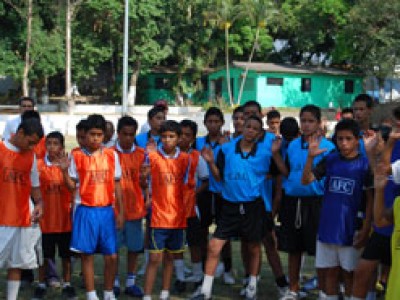
The Next World Cup All Star?
The eyes of hundreds of thousands of people are glued to the field. A commentator narrates the last seconds of the game: “… and there comes Landaverde with a pass from Valdez… Landaverde surpasses the defense quite easily; he aims at the goal… shoots… AND SCORES!!!” El Salvador wins. The people in the stadium shout and celebrate; the national team has won the World Cup.
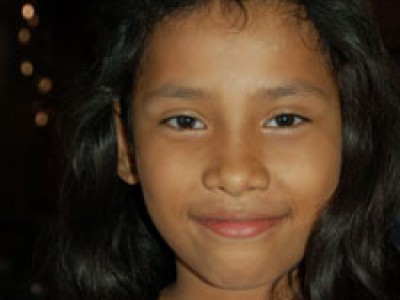
WANTED: the Freedom to be a Kid
According to the United Nation’s International Labor Organization, “Child labor is every work activity that children and adolescents do before turning 18 years old, that affects their physical, social, intellectual, psychological and moral development.” And poverty is a key contributor to the prevalence of child labor.
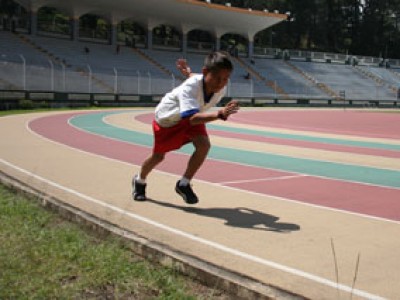
Run the Race in Such a Way as to Get the Prize
Sergio is confident enough to race and he knows he is a good runner. He has received many medals and recognition, but he knows how to keep both feet on the ground. He does not boast about himself. He knows that strength, wisdom and speed, in his case, are all gifts from God.
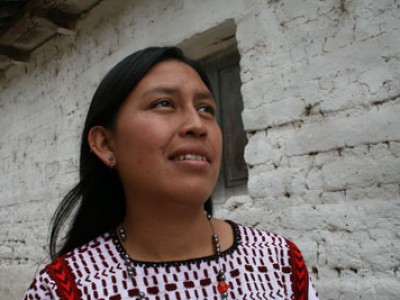
Overcoming Gender Inequality in Guatemala
Born and raised in Ixtahuacán, Huehuetenango, a town very close to the Guatemala-Mexico border, Silvia’s childhood was very hard.
Beautiful green mountains, fresh air and a quiet small town were the landscapes that surrounded Silvia throughout her childhood and adolescence. But Silvia had to make her best efforts to break many barriers that tried to stop her from becoming a successful woman in a culture that often sees and treats women as feeble.
The Bible: A Great Birthday Present for Children?
Children in México’s most impoverished places do not normally get the joy of celebrating a birthday. In Centro de Desarrollo Integral Cordoba Child Development Center, as in many other student centers supported by Compassion, children are recognized and celebrated with singing and cake, making a difference in their self-esteem and value.
At the development centers, children receive the gift of being children, away from their lack of money and food, inside a small refuge where sadness and abuse are not present.
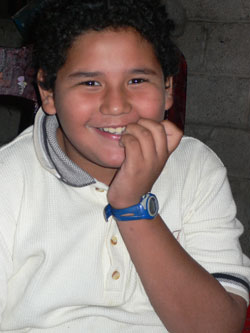 Pepe comes from a good family. His mother, Hilda, knows the Lord, but she came to the church when she and her husband were under much stress and struggles. Although the couple tried hard to stick together and to create a safe environment for their children, they used to fight over their lack of money.
Pepe comes from a good family. His mother, Hilda, knows the Lord, but she came to the church when she and her husband were under much stress and struggles. Although the couple tried hard to stick together and to create a safe environment for their children, they used to fight over their lack of money.
Hilda says she and her husband fought because they did not have enough money to eat. She recalls one day when they were yelling at each other and did not realize Pepe was hiding under the bed. They saw Pepe crawl up into the corner of the bed and pray, “God please give me much money so my daddy and mommy will not fight.”
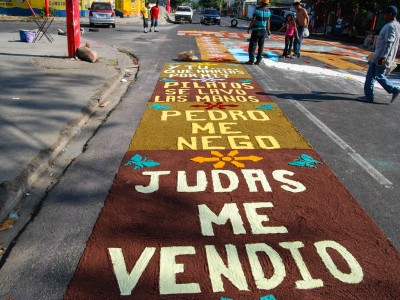
Easter in El Salvador
Easter Week in El Salvador is celebrated differently than the way it is celebrated in the United States. In the United States, Easter often includes the Easter Bunny and egg hunts. In El Salvador as well as many other Central American countries, it is celebrated with a much different atmosphere.
Easter feels like summer. The sun shines strong in the skies, the breeze somehow fresh, somehow warm. It is definitely the middle of the dry season in El Salvador, the equivalent of summer in northern lands. Everything around, from sale signs to music, talks about sun and sand. The opportunity to enjoy beaches that are just an hour away from San Salvador is almost here.
For a full week, students are out of school and have the opportunity to enjoy beaches, visit relatives and do nothing; it is almost the equivalent to spring break in the United States. However, there is one unequivocal characteristic that reminds every Salvadoran that it is not just a break, and that there is more than just sun and fun waiting for us during that week in April.
In El Salvador, the week of Easter is Holy Week, and the festivities revolve around Roman Catholic tradition. Roman Catholics account for nearly 60 percent of the population. Protestant (also called evangelical) churches account for slightly more than 20 percent.
Even though El Salvador does not have an official religion, since the time of colonization Roman Catholic traditions have been the most common and most practiced in the country. Easter Week is the most important celebration for the Roman Catholic Church.
“It is slightly different for the Protestant Church” says Sister Wendy, wife of Pastor Rodolfo at the Baptist Tabernacle Church of Majucla. “For most of the children, Easter Week is an opportunity to spend time with their families. People take advantage of this time to go back to their homeland and spend time with their families.”
One of the most important Easter traditions in El Salvador is Lent. During this 40-day period before Easter, named “Cuaresma” in Spanish, people fast, pray and give alms. The last week of the 40 days is called “Bigger Week” or “Holy Week.”
On Good Friday, there are two major processions. Early in the morning there is the “passion,” which is the representation or commemoration of the walk that Jesus took with the cross toward Golgotha. It is finished around noon.
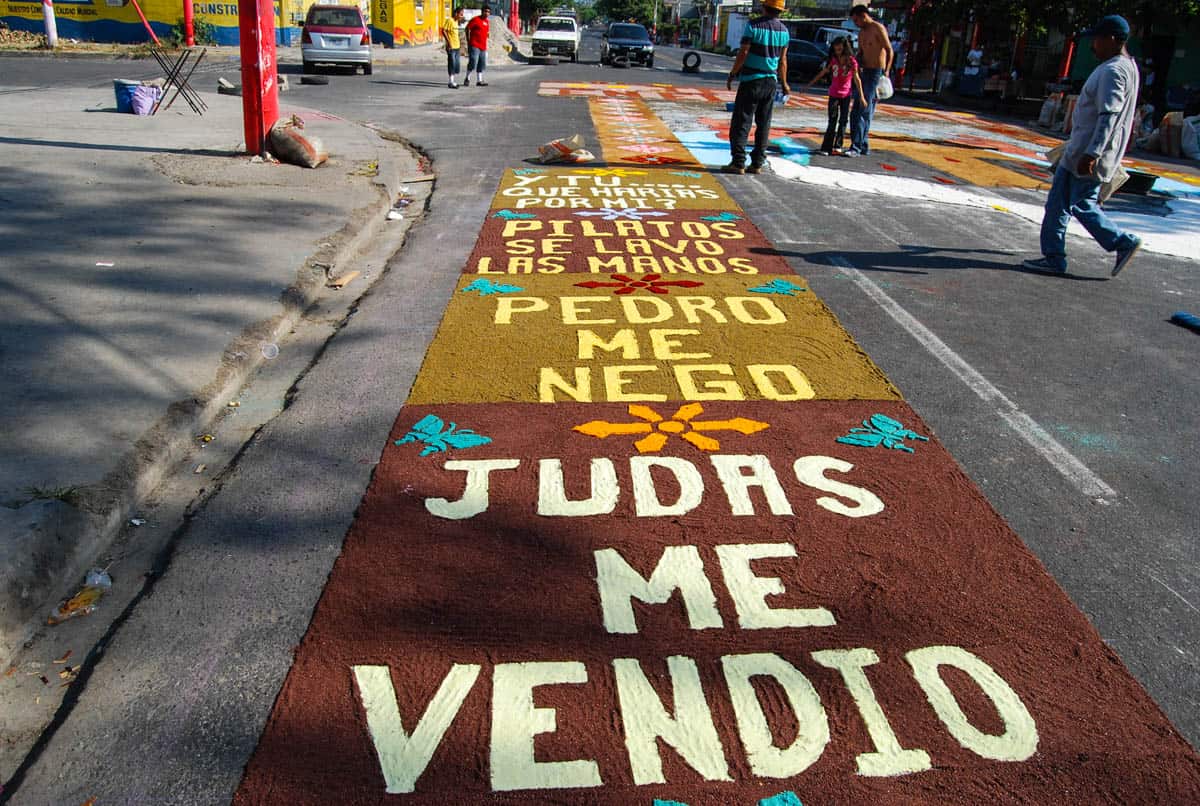
Then in the afternoon, Roman Catholic churches and communities start making rugs on the streets with sawdust, which will later be part of the path where the “holy funeral procession” will pass, carrying the symbolic dead body of Christ.
The making of these rugs represents one of the greatest traditions for the Roman Catholic Church in El Salvador, since entire streets and main avenues in many places of the country are completely closed. The rugs cover entire streets.
Appreciation of the rugs goes beyond religion. For Salvadorans, it is about appreciating the art and about appreciating the effort the people put into making the rugs. For Salvadorans, it is a gift, an offering they are making for Jesus.
Catholic or not, Salvadorans go out into the streets on Good Friday to see the rugs. Apart from this tradition for Good Friday, Holy Week develops differently for Protestants.
For the Evangelical Church in El Salvador, Holy Week is an opportunity to spread the Gospel to as many people as possible. If there is the opportunity to preach the Gospel and carry more people to the feet of our Lord, the church takes advantage of it and tells El Salvador the true meaning of Holy Week.
The Piñata Maker
The community of Montelimar is south of San Salvador, near a town named Olocuilta. The road near Montelimar, which leads to the airport, takes you past a scene that appears desolate. Even though the community has brick houses, electricity and potable water, the desolation of the surroundings and the distance from every other community make it feel almost like a batey or a slum.
The community holds about 2,500 homes, with an average of five people per home, according to the last census Rosario’s church conducted. (Rosario is a Compassion-assisted child in this community.) Most of the families rent space as they cannot afford to pay between $8,000 and $10,000 for a home. Most of them work at factories called maquilas, earning the minimum salary — about $170 per month.
Rent goes between $40 and $50, depending on the condition of the home. For some families, who earn their income as street vendors or have large families, their income barely covers the basic staples, and their option is to inhabit an unoccupied home, with the risk that someday an owner will appear and kick them out.
Sometimes a house will suddenly be empty. The reason lays in the comunity’s biggest problem — gangs.
In poor communities like Montelimar, gangs are a constant threat. Nobody comes in or out without them noticing. In fact, the commercial activity in the community has gone down, and small businesses such as pupuserias (little and simple dining places where they sell a local dish called pupusas) or convenience and staples stores are gone because the gangs ask them for “rent,” which means business owners have to pay a weekly amount of hundreds of dollars to receive “protection.” Otherwise, the gangs will do as they wish with the store and the owners.
In Rosario’s case, her family rents and her father, who sells sandwiches on a little cart on the streets of San Salvador and earns the minimum salary, supports the family.
Rosario is a quiet 12-year-old girl, very shy and organized. She is the oldest of four siblings. Even though she is very quiet, Rosario has many friends at school and at the child development center she attends.
Chico Accepts Christ
This week, I witnessed one of the most precious moments I’ve experienced since working at Compassion. I’m traveling as a writer with about 25 sponsors on a Sponsor Tour in Guatemala. On Monday, a few of us visited Chico’s home.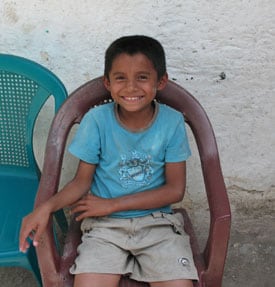
Chico is an adorable 9 -year-old sponsored child. He and eight other family members live in one house with no electricity. His mother, Miriam, does what she can to support her family.
“I work all day, every day to take care of my children. I make tostadas and sell them. Since their father left me, it’s up to me.”
Making and selling tostadas brings in about $10 a day.
While we interviewed the family, Laura, a sponsor from Virginia Beach, Va., asked Chico if he knew Jesus. After our interpreter, Carlota, asked Chico the question for us, she started to cry. I couldn’t figure out why.
Carlota explained that Chico’s answer was no, but that he was ready to invite Jesus into his heart. He had heard about Jesus at his development center, but hadn’t committed his life to Him yet. So, right there in the middle of their kitchen, Laura led Chico in a prayer of salvation.
She explained to Chico that when someone invites Jesus into their heart, angels in heaven rejoice (Luke 15:10). She told him, “The angels are having a big party for you, Chico, right now.”
Chico’s smile at that moment will stay with me the rest of my life.
If you’re part of Compassion’s ministry, you were a part of this moment.
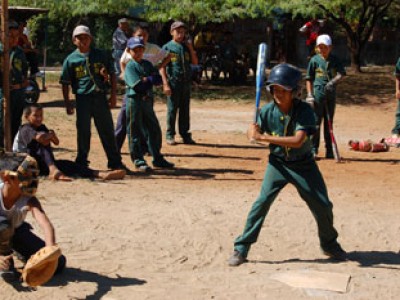
How Do Sports Help Release Children From Poverty?
Four years ago, the Alfa y Omega Student Center opened its doors to the children of the community in San Benito, Nicaragua. And the work that initially looked hard is now obtaining great results.
Little more than a year ago, the idea of putting together sports teams at the center flourished. Three teams were formed: baseball, volleyball and soccer, and children volunteered to be part of one of them.


